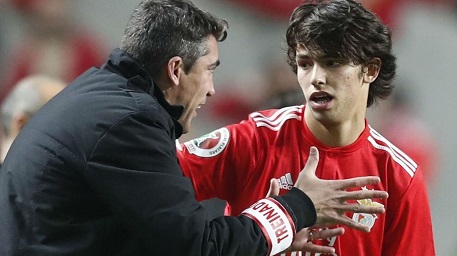 A group of youngsters who came through Benfica’s youth training programme helped the team lift Portugal’s 2018/19 Primeira Liga championship title as reported by bonusbets.com. Meanwhile, Porto and Sporting appear to have largely turned their backs on their academy products.
A group of youngsters who came through Benfica’s youth training programme helped the team lift Portugal’s 2018/19 Primeira Liga championship title as reported by bonusbets.com. Meanwhile, Porto and Sporting appear to have largely turned their backs on their academy products.
Benfica’s Seixal academy is located south of the River Tagus and in recent years has been churning out young, ambitious and highly talented players who have proven more than capable of thriving in the ultra-competitive world of professional football, some of them reaching the highest echelons of the game.
Benfica’s coach Bruno Lage is convinced that giving graduates from the Seixal Academy the chance to play in the first team was vital to help secure the Eagles the title this season. After beating Santa Clara 4-1, Lage said: “It was crucial to have younger players in the first team. It’s important so that other young players from Seixal believe that it’s possible to reach the senior team in the future.”
Nineteen-year-old João Félix was one of the players who impressed under Lage when the coach was in charge of the B-team. Upon Lage’s promotion to the top job, he had no hesitation in making the teenager an essential part of the senior team. In a recent interview he confided, “when I was given the job the first thing I thought was ‘well, I’m going to get the kid playing’.”
Lage knew exactly what Félix was capable of and how to get the best out of him. The brilliant striker helped turn Benfica into an unstoppable goalscoring machine, forming a fearsome threesome up front with Haris Seferovic and Rafa Silva, all three players hitting 20+ goals in the season.
After taking over from Rui Vitória – sacked as a result of a disappointing start to the campaign – Lage transformed Benfica’s season. The team scored an incredible seventy-two goals in nineteen Liga games, clocking up eighteen wins and one draw.
Lage changed the formation, switching from a static 4-3-3 to a more dynamic 4-4-2. He implemented a double pivot in Samaris and Gabriel (subsequently Florentino when Gabriel got injured), moved Félix central, shifted right-footed winger Rafa to the left, allowing Pizzi more room on the right-hand side of attack. The whole team clicked, which saw them become the highest scoring side in the Primeira Liga for 55 years, and overturn a 7-point deficit to leaders Porto when Lage took over to become champions.
Félix was not the only academy player to thrive. Centre-back Ferro (22 years old), Gedson Fernandes (20) and holding midfielder Florentino Luís (19) were all hugely impressive, the last of this trio so much so that he has been heavily linked with a move to Manchester City. Another Seixal graduate, Rúben Dias, is now a regular in the Portuguese national team, having already appeared over 80 times for Benfica at just 22 years of age.
Heavy investment over a decade in the Seixal youth academy has proven to be money well spent. Numerous hugely talented players have made a big name for themselves having begun their football education at Benfica, such as Manchester City’s Bernardo Silva, Juventus defender João Cancelo, Manchester United centre-back Victor Lindelöf, ex Barcelona midfielder André Gomes, and box-to-box midfielder Renato Sanches.
It will be interesting to see if Benfica’s success at fostering young footballing talent will influence their main rivals. With Porto set for a complete squad overhaul, and Sporting facing some big decisions in the wake of the likely sale of star man Bruno Fernandes, we may get some clues about whether Benfica’s success in putting faith in their young players will lead to a strategic rethink as regards investing in home-grown talents by the Dragons and the Lions.
When Porto and Sporting contested the Portuguese Cup final on Saturday to bring the curtain down on the domestic season, out of 36 players called up by the coaches – the two club’s 18-man squads named for the match – there was a grand total of one academy player: Sporting’s Jovane Cabral, who did not see a minute of action. Food for thought.
By Peter Hodges

